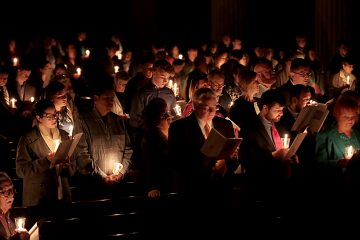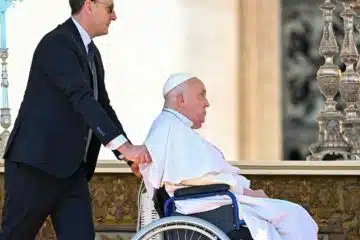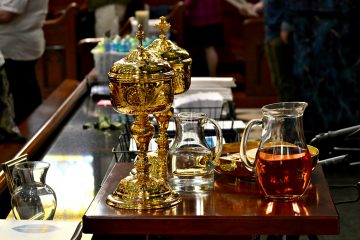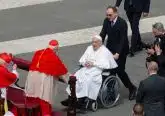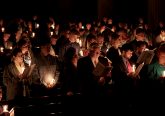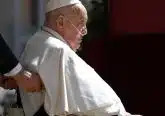On being Catholic and incarcerated
Monday, October 5, 2009
By Dean Preston
COLUMBUS — I’m Catholic, and I’m in prison.
I converted to Catholicism in prison and was baptized just over a year ago. Before this, I was lost in contradiction and depression, and although I didn’t formally call myself this, I was militantly anti-Catholic. I was a faux Bible scholar with no need of a church to tell me what to do, think or believe. I was my own authority in such matters.
In conversion, my theology, dogma and ethics changed without warning. To finally know what I believe — without contradiction — brought freedom and confidence that I’d never known before.
And it took something away as well — my insatiable need to argue to prove myself right. That changed into a desire to share my faith more by deeds than words. Was anyone ever won over by argument? I doubt it.
In prison, there is no shortage of argument — especially in matters of faith — but it’s more about ego than anything else. There are lot of teachers without students. But I am once again a student, ready to learn.
There are few days in prison that one looks forward to. One is the day you get out, and the other is any day you get a visit from family or a friend. Holidays, birthdays and anniversaries are days of numbness at best. But as incarcerated Catholics, we are given weekly Mass and Catholic instruction classes that add to the other, rare bright days for prisoners. For me, with a parole date of 2029, being able to add these days to the list is vitally important.
The sacraments are especially dear to me; they bring me closer to Christ. Being Catholic gives more meaning to many of the holidays that had become hardships in prison. Even suffering has been given meaning, which is good, because there’s a lot of that here.
Becoming Catholic in prison isn’t something I did as much as it is a grace I’ve been given. I celebrate mercy because I am undeserving and need it all the more.
In prison, I am in conflict with two natures and two codes. My spirit is at war with my flesh. Pornography and chastity of the mind are two major fault lines, and I fail often. It’s made even more difficult by the prison culture that says you’re not normal if you don’t objectify the opposite sex. This is no excuse; it just requires more vigilance. To control the appetites is necessary but wildly unpopular.
I rely on the positive influence of my family and the Catholic volunteers in the prison. It is their values I find creeping into my heart, their faces I see in my mind when facing a decision. This change in me is to God’s glory and their credit. The volunteers are why I want to do what’s right instead of what’s popular, no matter the cost. I imitate them as they imitate Christ.
I often pray, “O God, thank you for Mother Teresa and those like her. Were it not for their faith in action, I’d still be lost, and were it not for their doubt, I would think I was lost.”
In prison, I have learned a new form of prayer through art. Before Catholicism, I struggled with graphic artistry that was a sin and caused others to sin when they looked at it. “Thou shalt not make any graven image…” haunted me as an artist. I thought I’d have to cut that part of me out. But now, I can serve Christ and His church with my talent by painting icons and Christian messages.
In prison, there is drama, satire and tragedy. How does one remain a functioning, Christ-centered Catholic in the midst of rape, robbery and a constant threat of battery? How do we keep the wolves and the darkness at bay? To be honest, sometimes we don’t.
In prison, we suffer. We suffer isolation and we suffer abuse — at the hands of the staff and one another. As incarcerated Catholics, the question isn’t whether we suffer, but how do we handle that suffering? We are being given a grace. To have the opportunity to grow accustomed to suffering is a great blessing (although it is hard to admit at the time). Through our sins, we have thrown ourselves into this fire. By God’s grace, it has become for some of us a fire to purify us, while for others it is a kiln to either harden or destroy.
As we’re reminded, “My brothers, count it all joy when you fall into various trials, for the trying of your faith produces patience” (James 1:2). I only wish that I would catch myself before I complained, especially since I deserve my torment. Christ suffered silently and He was innocent.
To be Catholic and incarcerated is to wonder if I will ever be truly Christ-like. How can I be like Christ if I deserve my punishment?
What has kept me from succumbing to the darkness that is prison? Christ and His church. I have learned to love. It is a love that may one day require me to die for it but already requires that I live for it. Finally, I love another more than myself — Christ and His church.
Preston, 33, has been incarcerated since 1996 for two counts of murder. He was housed at Lebanon Correctional Institution (LeCI) from 1998 until being moved recently to Marion Correctional Institution, north of Columbus. He participated in RCIA at LeCI and was baptized into the Catholic Church by Archbishop Daniel E. Pilarczyk in 2008. His first parole hearing is scheduled for 2029.






